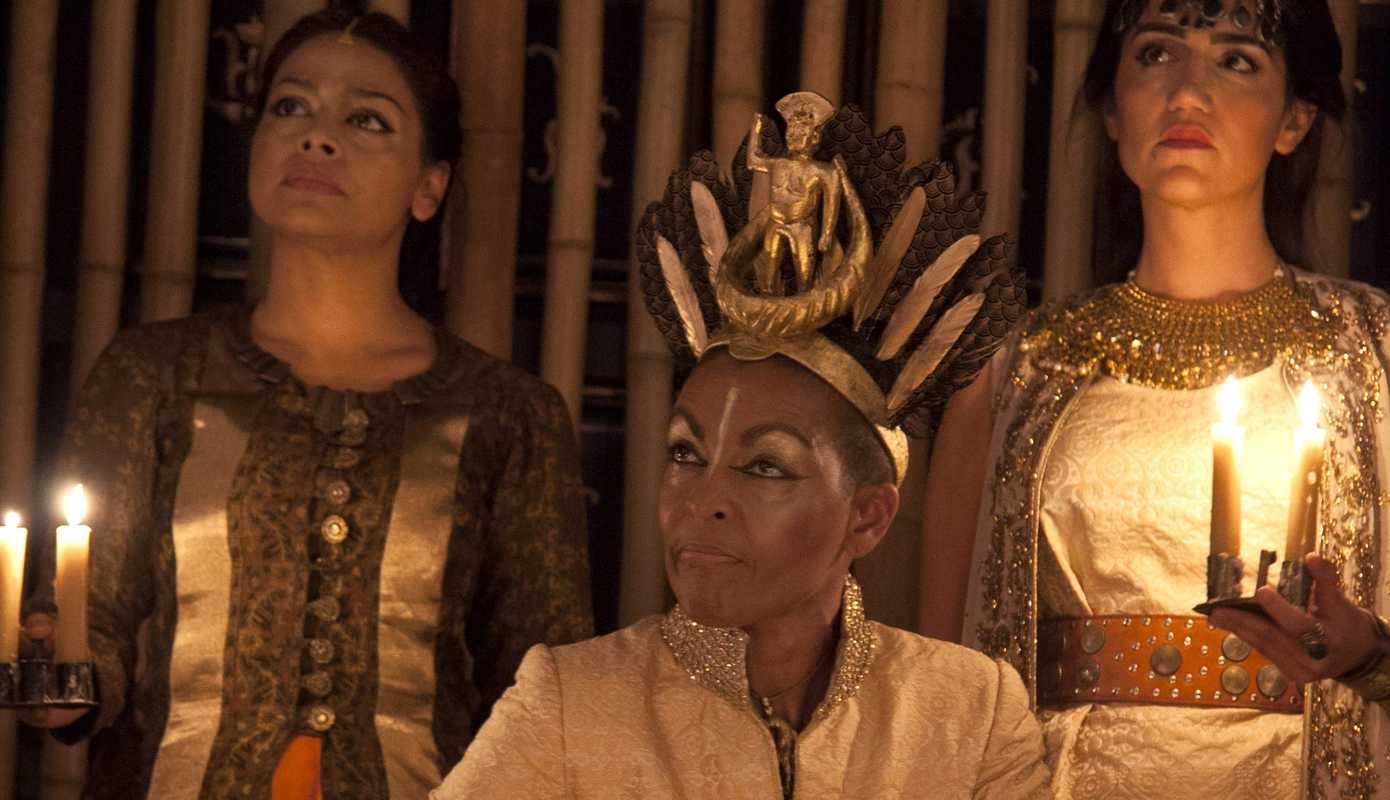During the interval of Richard II, currently on in The Globe’s Sam Wanamaker Playhouse, a lady two seats to the right of me turned to her friend and exclaimed, “I knew I would hate it!” She’d been in my line of sight for the first half of the play, so I wasn’t surprised. Not by her statement, it’s volume, the self-aggrandizing indignation inflecting it, nor the weak list of reasons that followed. Sadly, I missed most of this list, opting for 1-4 glasses of gratuit wine in the foyer instead of her unscheduled performance. When I returned to my seat for the second half, less angry and more merry, the lady was still there talking at her poor, poor friend. The play resumed and she silenced, rolling her eyes only half as much, seeming less outwardly affronted whenever Adjoa Andoh’s Richard II was on stage, which makes me think her friend told her to chill, or “take it down a notch,” or whatever version of language they use amongst themselves. Despite her presence, I did what I went there to do: I centred the show; I basked in the rich vibrancy and colour filling the Playhouse. That lady, like most others, stood up at the curtain call to give a standing ovation. And yes, to that question you’re asking yourself, she was.
I decided to give that lady some attention at the beginning of this piece because she was clearly very upset by what she felt was lacking that night. Everyone on stage was black and brown, the audience was very black and brown, and when you are an uncritical white person who is used to the structural whiteness of UK theatre, perhaps experiencing the lack of yourself for a couple hours feels like a personal insult. But what would I know? It’s not like a history-making opportunity to see myself represented on one of the most prestigious stages in my home city includes the unavoidable hurt feelings of a white woman. No, no. And maybe she wasn’t upset upset, maybe it wasn’t personal, maybe she just disliked some of the creative choices!
In a pre-show interview, co-directors Lynette Linton (Sweat, This Is, Assata Taught Me) and Adjoa Andoh (Troilus and Cressida, Leave Taking, Julius Caesar) talked about wanting the show “to be the people at the bottom of the empire telling the story.” They spoke the context in which they are helming a Richard II revival: Brexit is looming, a white supremacist puppet heads up the United States, Black British people are being deported from this country their home, and Grenfell serves as a constant reminder for how little our government cares about working class communities of colour and working class people in general. Linton and Andoh saw this moment as an opportunity to highlight the aspects of Shakespeare we aren’t used to seeing, the Shakespeare who isn’t “exclusive and elusive, but [someone] who cares about human beings.” All human beings.
This production gives audiences the chance to imagine a world where the colonisation and subjugation of black and brown lands and humans isn’t inherent. For that reason alone, it is necessary. It is powerful to imagine a Britain ruled by black women, a Britain where queer relationships, unmarred by colonial laws, are an unspoken norm, a Britain where the regalia and architecture of pre-colonial communities of colour make up the nation’s visual identity. It is thrilling to see a different paradigm made possible, even if just on a stage. But what is thrilling to me can clearly be threatening to others.
Theatre functions as more than just entertainment; it gives me the opportunity to hold up and question the thoughts, feelings, and understanding I have of the world built up around me. It gives me the opportunity to think more deeply about my place in it. These stories are not presented to us in a vacuum and so the worth and significance of a show, of this show, can exist outside of some love/hate binary. That doesn’t mean it was perfect and above critique. There were certainly moments where I wished the actors trusted themselves more, leaning on the strength of subtlety rather than coercive histrionics, and the fight direction wasn’t always convincing. But there were also moments that, beyond being beautifully directed and acted, were transcendental. Like when Dona Croll’s John of Gaunt makes his famous speech, the words, out of a mouth belonging to someone both black and woman, gradually gain weight and momentum, filling the Playhouse, commanding every ear listen:
This royal throne of kings, this sceptred isle,This earth of majesty, this seat of Mars,This other Eden, demi-paradise,
…
This land of such dear souls, this dear, dear land,Dear for her reputation through the world,
…
England, bound in with the triumphant sea,Whose rocky shore beats back the envious siege
…
That England that was wont to conquer othersHath made a shameful conquest of itself.
And the audience, very black and brown, engaged throughout, became members of a society in conversation with the work – reflecting, chastising, illuminating it. Throughout Croll’s monologue all I could think or feel was this is exactly what theatre is meant to be. And it would be naive, mindless even, to expect everyone to be comfortable with this significance. For many people change elicits fear, especially if that change doesn’t involve them remaining on top, and even more so if that change doesn’t centre them at all.
I think about that woman sat two seats to the right of me, that walking talking metaphor, and I chuckle. Because she was tragic. She represents so many on this a sceptred isle, still smoking delusional pipes, masking their theft-based supremacy as self-made grandeur, unable to fathom that the world around them, hip to the truth, is changing. I don’t know how much of that change will last, particularly in theatre. The leaders of our institutions are still largely white, and while I hope they continue to make progressive programming decisions, those in charge of a broken structure can hardly be its revolutionaries. The structure itself needs to change. Still, I will bask in the glory of my people making history on stage. And I will laugh, heartily, at anyone upset by it.
Richard II is on at the Sam Wanamaker Playhouse until the 21st April 2019. Get tickets here.



